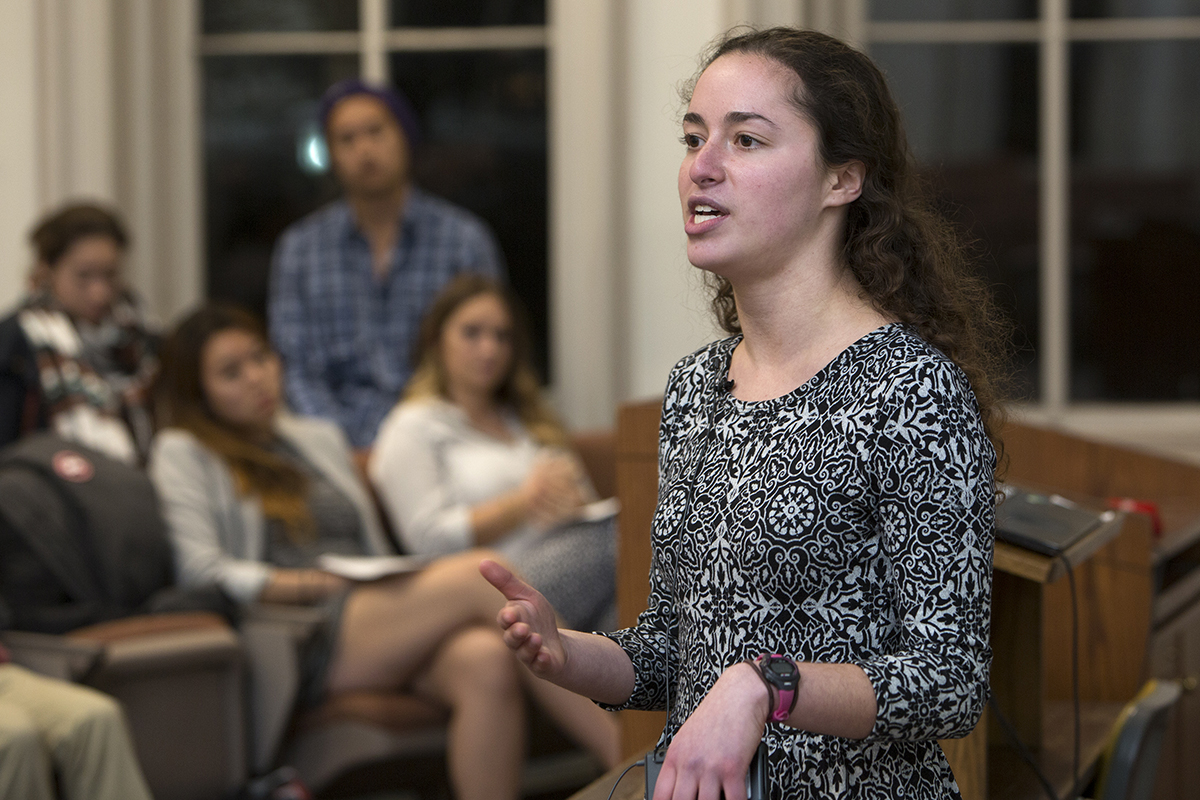Undergrad researchers make pitches at CURBx
By Amanda Bosworth

At CURBx – Cornell’s version of TEDx Talks – seven undergraduate students each explained their humanities and STEM research in a five-minute presentation.
With research topics ranging from eating habits to the possibility of developing “invisibility cloaking” materials, the second annual CURBx Talk was held Nov. 21 in McGraw Hall. The event was organized by Alisha Nanji ’19, an executive member of the Cornell Undergraduate Research Board, and emceed by co-president Ronald Forster ’17.
“I wanted to give students an opportunity to present their research in something other than the typical paper format. In addition, when people think about research, many immediately think of sciences such as biology and chemistry,” said Nanji. “CURBx allowed students who are not involved in these types of sciences to also showcase their research, and it demonstrated how research can also be conducted in the humanities and social sciences.”
The People’s Choice Award for the best presentation went to Daniel Rosenfeld ’18 for “Vegetarian Identity: The Psychology of Being a Vegetarian.” He explained that vegetarianism is not just meat avoidance, but rather “an individual’s thoughts, feelings and behaviors regarding being vegetarian.”
Rosenfeld invited the audience to imagine going to a steakhouse with three friends. If your friends order the filet mignon, sirloin and porterhouse, and you order the grilled tofu, you will be characterized as a member of an “out group.” Our food choices, he said, distinguish us from friends and family and impact how they see us, how we see them and our self-perception. Vegetarianism is a social construct, he added, with many consequences for one’s identity.
Athith Krishna ’17 is researching the possibility of using hyperbolic materials to achieve the illusion of invisibility. Invisibility, he explained, is a matter of bending wavelengths. The only natural material that might act as a visual cloak is cubic boron nitride, and Krishna is partnering with the Cornell NanoScale Facility and the Cornell Center for Materials Research to explore its uses.
Elena Gupta ’19, explained three studies she conducted on the benefits of weighing oneself. Gupta showed that study subjects ate less of a chocolate snack when they were first asked to weigh themselves. She proposed self-weighing as one way to combat obesity, because it stimulates individuals to eat less.
Together, Madison Ulczak ’17 and Suzy Park ’18 explained their studies of juror reasoning. They found that, after listening to a trial recording, mock jurors made highly emotional decisions regarding defendant guilt or innocence. However, when deliberating with other jurors, emotions gave way to facts and details.
Talia Bailes ’20 conducted research last summer at a children’s hospital in Cincinnati, Ohio. She assisted a physician/children’s book author in testing the validity of a new screening tool for early childhood “emergent literacy” skills. By age 3, she said, children should have pre-reading skills – like how to hold a book and turn the pages.
Orvill Delatorre ’19 presented his work with civil engineering’s Richardson Lab to test the purity of drinking water using a hollow-fiber filter and pump. The purpose of the system is to bring clean water to remote locations that currently lack needed infrastructure.
Gabriella Lifsec ’19 described her contribution to the ILR School’s Worker Institute website. It was created as a complement to Professor Lowell Turner’s 2014 book, “Mobilizing Against Inequality.” Most recently, Lifsec has been collecting data on the Cornell student walkout to protest the election of Donald Trump and Ithaca’s subsequent declaration as a sanctuary city for undocumented immigrants.
Amanda Bosworth, a Cornell doctoral student in history, is a writer intern for the Cornell Chronicle.
Media Contact
Get Cornell news delivered right to your inbox.
Subscribe